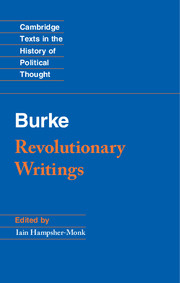 Revolutionary Writings
Revolutionary Writings Published online by Cambridge University Press: 05 June 2014
Variant reading from Reflections
The following text was removed by Burke for the third edition (16 November 1790) and replaced with the text between pp. 180 and 183 in the present edition (see fn 339).
Now take in the other point of view, and suppose their principle of representation according to contribution, that is, according to riches, to be well founded, and to be a necessary basis for the republic, how have they provided for the rich by giving to the district, that is to say, to the poor in the district of Canton and Commune, who are the majority, the power of making an additional number of members on account of the superior contribution of the wealthy? Suppose one man (it is an easy supposition) to contribute ten times more than ten of his neighbours. For this contribution he has one vote out of ten. The poor outvote him by nine voices in virtue of his superior contribution, for (say) ten members, instead of out-voting him for only one member. Why are the rich complimented with an aristocratic preference, which they can never feel either as a gratification to pride, or as a security to fortune? The rich indeed require an additional security from the dangers to which they are exposed when a popular power is prevalent; but it is impossible to divine, on this system of unequal masses, how they are protected; because the aristocratic mass is generated from democratic principles; and the prevalence in the general representation has no sort of connection with those on account of whose property this superiority is given. If the contrivers of this scheme meant any sort of favour to the rich in consequence of their contribution, they ought to have conferred the privilege either on the individual rich, or on some class formed of rich persons; because the contest between the rich and the poor is not a struggle between corporation and corporation, but a contest between men and men; a competition not between districts, but between descriptions. It would answer its purpose better if the scheme was inverted; that the votes of the masses were rendered equal; and that the votes within each mass were proportioned to property. In any other light, I see nothing but danger from the inequality of the masses.
To save this book to your Kindle, first ensure no-reply@cambridge.org is added to your Approved Personal Document E-mail List under your Personal Document Settings on the Manage Your Content and Devices page of your Amazon account. Then enter the ‘name’ part of your Kindle email address below. Find out more about saving to your Kindle.
Note you can select to save to either the @free.kindle.com or @kindle.com variations. ‘@free.kindle.com’ emails are free but can only be saved to your device when it is connected to wi-fi. ‘@kindle.com’ emails can be delivered even when you are not connected to wi-fi, but note that service fees apply.
Find out more about the Kindle Personal Document Service.
To save content items to your account, please confirm that you agree to abide by our usage policies. If this is the first time you use this feature, you will be asked to authorise Cambridge Core to connect with your account. Find out more about saving content to Dropbox.
To save content items to your account, please confirm that you agree to abide by our usage policies. If this is the first time you use this feature, you will be asked to authorise Cambridge Core to connect with your account. Find out more about saving content to Google Drive.